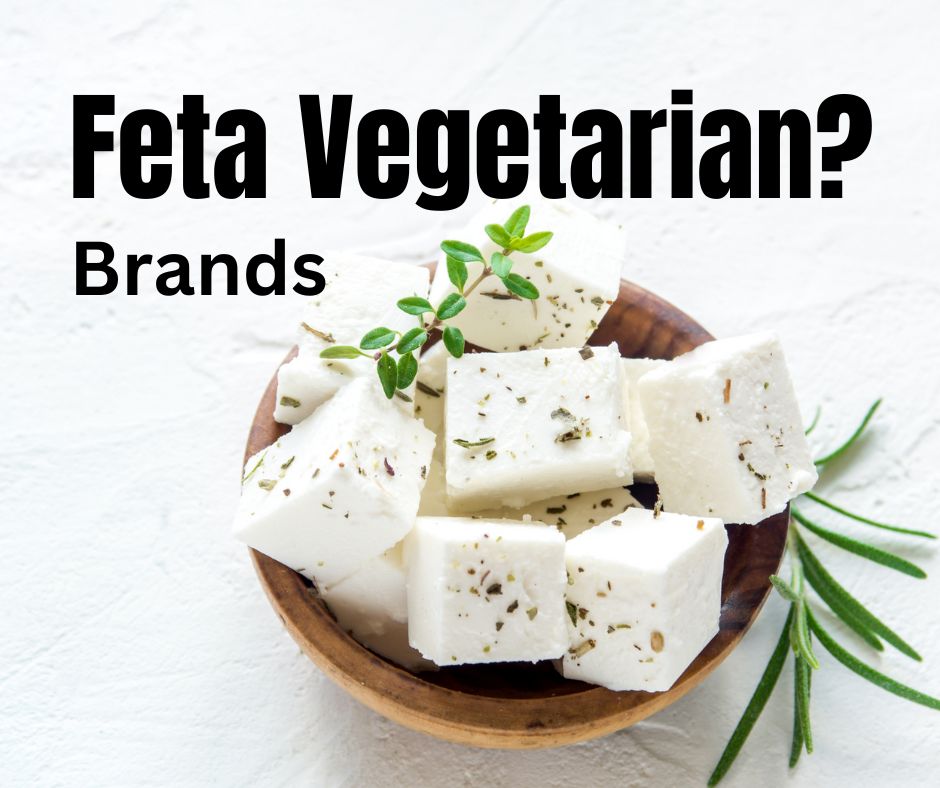Last Updated on September 19, 2023 by Aaron
Feta cheese can be vegetarian, but it’s not always so. The primary concern regarding whether feta (or any cheese) is vegetarian is the source of the rennet used in its production.
Rennet is an enzyme that aids in the coagulation of milk to form curds and whey, a crucial step in cheesemaking. Traditional rennet is derived from the stomach lining of young ruminants, typically calves, which makes it non-vegetarian.
In many countries, the source of the rennet doesn’t have to be specified in detail on the label.
There are vegetarian alternatives to traditional animal rennet, such as microbial rennet (derived from fungi or bacteria) or genetically engineered rennet.
How About Greek Feta?
Traditional feta cheese, especially from Greece, often uses animal-derived rennet. However, there are plenty of feta-style cheeses produced globally that might use vegetarian-friendly coagulants.
In the European Union, “Feta” cheese has been granted a Protected Designation of Origin (PDO) status, meaning that only cheeses produced traditionally from specific regions of Greece can carry the “Feta” label. Many of these traditional processes involve the use of animal rennet.
Some cheese enthusiasts argue that the type of rennet used can affect the flavor and texture of the cheese.
If you’re shopping outside of Europe, the cheese might be labeled as “Greek-style” or “feta-style” cheese if it’s not PDO-certified, even if it’s made in Greece.
Let’s go through some popular Greek feta brands for vegetarians:
Dodoni’s feta is one of the most internationally recognized Greek brands. They stated to only use vegetarian rennet for their feta product, go website. The other one you can look for is called Kourellas, it is a family-owned Greek dairy brand known for its organic products. They produce feta cheese using vegetarian rennet, as mentioned on the website. The brand emphasizes traditional methods combined with modern organic practices.
Kolios Greek Feta is another family-owned company that offers a PDO feta that is widely appreciated. According to their packaging, it is made with microbial rennet. And lastly, not exactly a Greek feta, but Valbreso Feta is known for its French-style feta made from sheep’s milk. The taste and texture are a bit different from the Greek version but still very popular.
You might not know much about the non-dairy version of feta we discussed previously if you don’t mind trying feta substitutes like soy feta!
The Commercial Feta Brands
If a label simply says “enzymes” or “rennet,” and it doesn’t have a clear vegetarian label, it can be challenging to determine the rennet’s origin. In places like the U.S., there’s a broader definition of feta, and it might be made from cow’s milk, sheep’s milk, or a blend. Many U.S. commercial feta brands use microbial rennet due to its cost-effectiveness and the growing demand for vegetarian products, but this isn’t a universal standard.
One that’s worth mentioning is the President Feta website, which has stated not suitable for vegetarians as it contains lipase, which is of animal origin. Lipase can break down fats and add a distinct flavor to the cheese.
A popular brand that often falls under the impression of vegetarian-friendly is Athenos Feta. The inclusion of lipase liquid and rennet paste derived from animals, as described in the response from Kraft Foods regarding Athenos Feta Cheese, is a concern for vegetarians.
In the UK, many supermarkets have adopted labeling systems to make it easier for consumers to identify products that fit their dietary needs. The “V” label often signifies that a product is suitable for vegetarians.
Feta cheese from Odysea was traditionally made with animal rennet. However, these days, producers use commercial rennets that make the feta suitable for vegetarians.
The Feta Cheese Without Rennet
It’s possible to make feta without rennet by using acid to coagulate the milk. This method relies on an acid, such as citric acid, vinegar or lemon juice to curdle the milk. The resulting cheese is generally softer and might have a slightly different texture than traditional feta made with rennet, but it still can be delicious and is suitable for vegetarians.
While the method is well-known and often used in home cheesemaking, it’s less common for commercial brands to rely solely on this method for producing feta. Paneer, a popular cheese in Indian cuisine, is often made this way.
Some cheeses might use cultured products, like kefir or certain types of yogurt, as a coagulating agent.
On a large commercial scale, rennet remains the predominant coagulating agent for feta production. The feta produced will be firmer, faster and more consistant, and also taste better. Some cheese manufacturers use a combination of acid and rennet in the cheese-making process.

